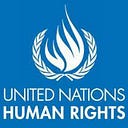Sexual and reproductive health information vital for women and girls
Michalina Drejza seeing being a doctor the same as a human rights defender, as she pushes to provide timely information and services for women and girls in Poland.
For Michalina Drejza, this call to link the Hippocratic oath for doctors and the Universal Declaration of Human Rights came when she first started seeing actual patients.
Until then, Dr Drejza, a doctor from Poland who specializes in obstetrics and gynecology, found that health and human rights were un-linked academic concepts. She learned biology, chemistry and other disciplines and she loved the research. When it came time to apply this information to actual human beings, she found the care she could offer was limited due to lack of information, both for herself and for patients and she responded to pervasive misinformation.
“I started working with patients and with clients and I saw that medicine became more of a social skill and I could see what was lacking in my education,” she said. “I could see, at many times, how human rights were being violated during my education or …[by] denying a woman access to the full information that she needs to make decisions about her body. That is why I think medical doctors and other health professionals are naturally human rights defenders.”
Dr Drejza sees it as her mission to clear up misinformation and push for evidence-based policies regarding reproductive health. She currently works as a consultant with the World Health Organization (WHO) on the human reproductive team. In her native Poland, she says that lack of access to information, for both patients and even medical students — has been one of the biggest challenges promoting health and human rights. For example, while at medical school, future health workers on obstetrics rotation are not provided with information on how to perform safe abortions or how to prescribe emergency contraception.
In addition, myths still abound concerning contraception and termination of pregnancy, she says. For example, people are told that hormonal contraceptives, such as the contraceptive pill, can lead to infertility or that if a woman has an abortion she has a higher chance of breast cancer.
“These are actual quotes that I heard while in class,” Dr Drejza said. “This is why it is so important to base medical curricula on evidence and not on the beliefs of the teachers.”
Right to highest attainable standard of health
Last year, the High Level Working Group on Health and Human Rights, co-chaired by H.E. Tarja Halonen, former President of Finland and Ms. Hina Jilani of the Elders, and established by WHO and OHCHR, launched a report on the provision of health care through a human rights lens for women, girls and adolescents. The report was launched at the World Health Assembly and the Human Rights Council — the first report of its kind to be formally considered by both bodies. It makes the case that health and human rights are intrinsically linked — that health cannot be improved if rights are not upheld, and rights cannot be realized without the pre-condition of good health.
“The right to the highest attainable standard of physical and mental health has been recognized by the Universal Declaration of Human Rights,” Peggy Hicks, Director of Thematic Engagement, Special Procedures and Right to Development at the UN Human Rights Office, told an audience during an event on health and human rights that took place in Geneva this past June. “(T)he human rights framework requires (…) putting the dignity and agency of rights holders at its centre and fighting stigmatization and discrimination.”
The Office’s latest report on right to health highlights several good practices that underpin a human rights approach to health. One of the areas focused on is accessibility, which includes not just economic and physical access to health services in a non-discriminatory manner, but also the right to seek, receive and impart information and ideas concerning health issues.
This need for knowledge, is particularly acute in the area of sexual and reproductive health, said UN Deputy High Commissioner for Human Rights Kate Gilmore. At the launch last year of the High-Level report, she bemoaned the “misanthropic roll back on hard won health gains particularly for women and girls”.
“The consequences of deliberate denial of access to sexual and reproductive health services and information brings selective devastating consequences for women and adolescent girls –devastating their health, destructive for their exercise of all other rights and exacting unaffordable costs on them, their families and their communities.”
Heeding the call
Dr Drejza heeded the call to become a human rights defender. She, along with other doctors and health care workers in Poland, created Doctors for Women, an informal initiative that unites doctors from across Poland to help women access emergency contraception. Although previously available over the counter, the Polish government now requires women obtain a doctor’s prescription to access emergency contraception. In Poland, doctors can also opt not to treat a patient based on their personal beliefs. Doctors for Women provides prescriptions for those women who are denied as a result of such conscientious objections.
While actions like this are needed, but Dr Drejza said, it is the daily actions that helped her to realize that being a doctor means being a human rights defender.
“These everyday conversations you have and things you say are completely normal, but they are human rights. This is what changed everything for me completely. Human rights wasn’t the big protests, but more the everyday events.”
